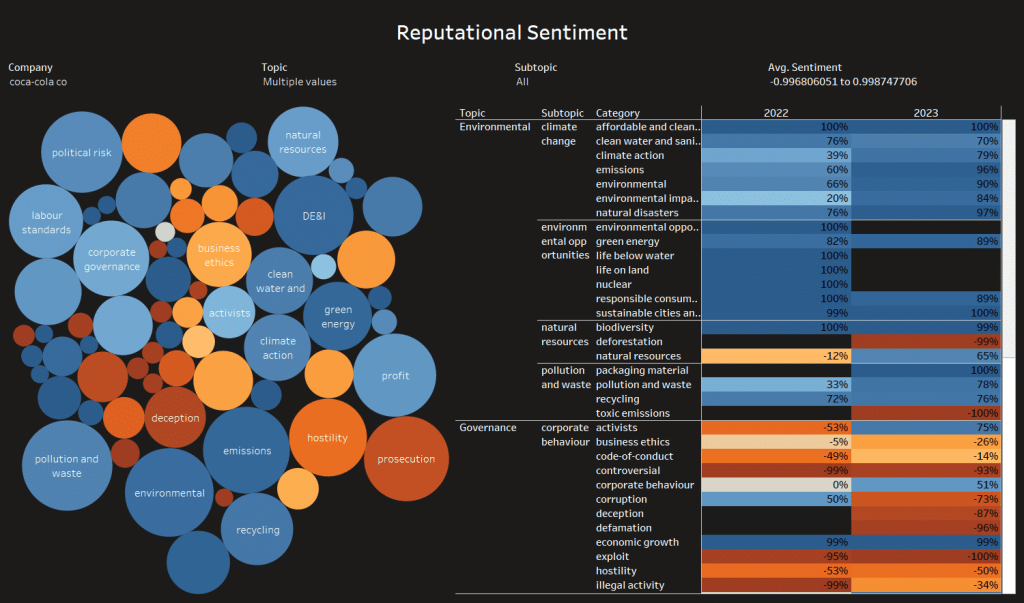In today’s corporate landscape, sustainability has become an essential aspect of business operations. Companies are increasingly embracing ESG practices to ensure a greener and more responsible future. As a global leader in the beverage industry, the Coca Cola Company has been at the forefront of sustainability efforts. In this article, we delve deep into the Coca Cola ESG score and take a closer look at the extensive sustainability endeavours undertaken by the beverage giant.
Understanding the Coca Cola ESG Score
The Coca Cola ESG score is a comprehensive measure of its performance in environmental conservation, social responsibility, and ethical governance. The ESG score evaluates various criteria such as carbon emissions, water usage, waste management, employee diversity, community engagement, and board diversity. It provides an overall assessment of the company’s commitment to sustainable practices and its impact on society and the environment.
Our Coca Cola ESG score – a culmination of our ESG intelligence on the company – reflects the company’s dedication to sustainable operations and its efforts to minimize its ecological footprint. This score is essential for investors, consumers, and other stakeholders who prioritize sustainability. By analyzing Coca Cola’s ESG score, we can gain insights into the company’s sustainability initiatives and their impact on the environment and society.

Environmental Sustainability Initiatives
Coca Cola has implemented several initiatives to reduce its environmental impact and promote sustainability. One of its notable efforts is the replenishment of water resources. The company aims to replenish the water it uses in its beverages and production processes by 2020. Through partnerships with local communities and organizations, Coca Cola has successfully replenished billions of liters of water worldwide.
Additionally, Coca Cola has made strides in reducing its carbon emissions. The company has set ambitious targets to reduce its carbon footprint throughout its value chain, from manufacturing to distribution. By investing in renewable energy sources and implementing energy-efficient technologies, Coca Cola is working towards its goal of becoming a carbon-neutral company.
Waste management is a crucial aspect of Coca Cola’s sustainability efforts. The company has implemented recycling programs and initiatives to promote responsible waste disposal. Through innovative packaging designs and increased use of recycled materials, Coca Cola aims to minimize waste generation and promote a circular economy.
Coca-Cola’s Environmental Impact and the Plastic Problem
While many companies are striving to improve their ESG performance, some face significant challenges in addressing their environmental impact. A prime example is Coca-Cola, which has been consistently identified as one of the worst plastic polluters globally. The Coca-Cola Company increased its use of plastic packaging by over 6% or over 454 million pounds (206,000 metric tons) to a reported 3.43 million metric tons in 2022. This massive plastic production contributes significantly to the global plastic pollution crisis, although at the same time there are reports they are make strides towards its World Without Waste goals of reducing PET use by three million metric tons by 2025.
In response to growing criticism and environmental concerns, Coca-Cola has pledged to tackle the plastic issue. The company has set goals to reduce plastic waste and increase the use of recycled materials. By 2030, Coca-Cola aims to collect and recycle the equivalent of every bottle or can it sells globally.
As part of its commitment to the Ellen MacArthur Foundation’s New Plastics Economy Global Commitment, Coca-Cola has promised to:
- Make 100% of its packaging recyclable globally by 2025
- Use at least 50% recycled material in its packaging by 2030
- Collect and recycle a bottle or can for each one sold by 2030
Despite these commitments, critics argue that Coca-Cola’s efforts are insufficient given the scale of its plastic bottle production. The company’s continued reliance on single-use plastics and virgin plastic in its packaging remains a significant environmental concern.
To truly address its environmental impact, Coca-Cola faces the challenge of fundamentally rethinking its packaging strategy. This may involve investing in alternative packaging materials, supporting improved recycling infrastructure, and potentially moving away from single-use containers altogether.
As investors and consumers become increasingly aware of environmental issues, companies like Coca-Cola will need to demonstrate substantial progress in reducing their plastic footprint. This case highlights the complex challenges that many companies face in aligning their business practices with ESG principles and the growing expectations for corporate environmental responsibility.
Social Sustainability Initiatives
Coca Cola recognizes the importance of social sustainability and is committed to making a positive impact on communities worldwide. The company actively engages in various initiatives to uplift local communities, focusing on education, clean water access, and women empowerment.
One of Coca Cola’s flagship programs is the Coca Cola Foundation, which supports numerous community development projects. Through partnerships with NGOs and local organizations, the foundation provides financial assistance and resources to improve education, health, and access to clean water in underserved areas.
Furthermore, Coca Cola is dedicated to promoting diversity and inclusion within its workforce. The company believes in fostering an inclusive culture that celebrates differences and embraces diverse perspectives. Through initiatives and programs, Coca Cola strives to create equal opportunities for employees of all backgrounds and identities.
Governance and Ethical Practices
Governance and ethical practices are crucial for any company aiming to achieve sustainability. Coca Cola has implemented robust governance measures to ensure transparency, accountability, and ethical conduct. The company maintains a strong code of business conduct that outlines its commitment to integrity, fair competition, and compliance with legal and regulatory requirements.
Coca Cola’s board of directors is responsible for overseeing the company’s governance practices and ensuring ethical behavior at all levels. The board comprises experienced professionals from diverse backgrounds, bringing valuable perspectives and expertise to decision-making processes.
Furthermore, Coca Cola actively engages with stakeholders to gather feedback, address concerns, and incorporate their perspectives into its sustainability strategies. The company believes in open and transparent communication, fostering trust and long-term relationships with its stakeholders.
Impact of Sustainability Efforts on Coca Cola’s Brand Image and Reputation
Coca Cola’s sustainability efforts have had a significant impact on its brand image and reputation. By prioritizing sustainability, the company has positioned itself as a responsible corporate citizen, appealing to conscious consumers who value environmentally and socially responsible brands.
The Coca Cola brand has become synonymous with sustainability, and its commitment to environmental and social causes resonates with consumers worldwide. This positive perception not only enhances customer loyalty but also attracts new consumers who align with Coca Cola’s values.
Moreover, Coca Cola’s sustainability initiatives have garnered recognition and accolades from various organizations and industry bodies. These accolades not only validate the company’s efforts but also contribute to its positive brand reputation.
Challenges Faced by Coca Cola in Achieving Sustainable Goals
Despite its significant sustainability efforts, Coca Cola faces several challenges in achieving its sustainable goals. One of the primary challenges is the complex and global nature of its supply chain. Coca Cola relies on a vast network of suppliers, distributors, and bottlers, making it challenging to monitor and ensure sustainable practices throughout the value chain.
Another challenge is the increasing competition and changing consumer preferences. As consumer awareness about sustainability grows, companies across industries are adopting sustainable practices. Coca Cola needs to continuously innovate and evolve its sustainability initiatives to stay ahead of the competition and meet the ever-changing demands of its consumers.
Additionally, engaging diverse stakeholders and addressing their concerns can be a complex task. Balancing the interests of shareholders, employees, consumers, communities, and the environment requires careful planning and effective communication.

Future Plans and Goals for Sustainability
Looking ahead, Coca Cola aims to strengthen its sustainability efforts and set new benchmarks for the industry. The company has set ambitious goals for 2030, focusing on four key areas: water, women, well-being, and waste.
Coca Cola plans to continue replenishing water resources in communities where it operates, aiming to achieve a water-neutral status. The company also aims to empower five million women entrepreneurs through its initiatives, promoting gender equality and economic empowerment.
Furthermore, Coca Cola will focus on promoting well-being by offering a diverse range of beverage options and providing transparent nutritional information. The company aims to reduce the sugar content in its products and offer more low- or no-sugar alternatives.
Lastly, Coca Cola aims to achieve a world without waste by promoting recycling, investing in sustainable packaging solutions, and reducing the environmental impact of its packaging.
Coca Cola ESG Score: Competitor Comparison
To assess Coca Cola’s sustainability performance, it is essential to compare its ESG score with that of its competitors. While each company’s ESG score may vary based on their industry and specific sustainability initiatives, such comparisons provide valuable insights into their relative positions.
To access our ESG scores on Coca Cola’s competitors see below:
- PepsiCo ESG score
- Nestlé ESG score
- The Kraft Heinz Company ESG score
- Monster Beverage Corporation ESG score
- Unilever ESG score
- Danone ESG score
Coca Cola ESG Score: Summing Up
The Coca Cola ESG score highlights its dedication to sustainability and responsible business practices. Through its environmental, social, and governance initiatives, Coca Cola has established itself as a leader in the beverage industry.
ESG scores serve as a vital tool for stakeholders to evaluate a company’s sustainability efforts and its impact on society and the environment. As consumers increasingly prioritize sustainability, companies that embrace ESG practices are better positioned to meet customer expectations and remain competitive in the long run.
Coca Cola’s sustainability efforts not only contribute to a greener and more socially responsible future but also enhance its brand image and reputation. By setting ambitious goals, addressing challenges, and collaborating with stakeholders, Coca Cola is paving the way for a more sustainable corporate world.
Find Out More
Are you looking for more granular data on Coca Cola’s ESG practices?

